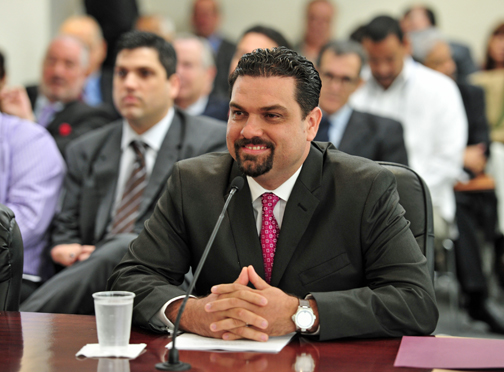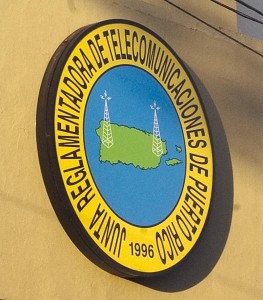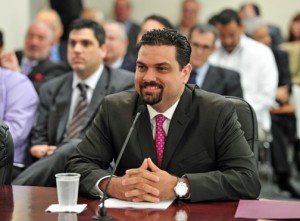Rúa-Jovet sworn-in as Puerto Rico Telecom Board chief

Attorney Javier Rúa-Jovet will be sworn-in as the fourth president of the Puerto Rico Telecommunications Regulatory Board today, ushering in a new chapter for the agency that’s a few years shy of marking 20 years of overseeing one of the island’s most important economic sectors.
As head of the agency — which will work now more like the Federal Communications Commission with a five-member decision-making panel — Rúa-Jovet plans to address several key issues as soon as he walks in the door, he told this media outlet during an exclusive interview.
“It’s very important that as much as possible, we get the TRB on board with what the FCC has already started, which is redirecting subsidies toward broadband. This could entail amendments to Law 213 or the universal service regulations, or both,” said Rúa-Jovet, referring to several telecom industry laws.
The issue of broadband was something the newly appointed TRB chief brought up during his confirmation hearings two weeks ago, when he told lawmakers that Puerto Rico’s 35 percent broadband penetration rate needs to improve, as it pales in comparison to the 66 percent average on record for the U.S. mainland.
At present, the TRB is using universal service fund money — which it receives from every telecom company registered to do business in Puerto Rico — to subsidize regular telephone services. That, Rúa-Jovet said, needs to be refocused.
“An important fact is that in the United States, 66 percent of households are served by broadband. However, in Puerto Rico, only 35 percent do, because it’s very expensive,” he said. “We occupy position 36 of 142 countries according to the World Economic Forum’s Global Information Technology ranking and although we’re among the leaders in America, clearly we have room for improvement. This presents unique opportunities.”
“We have to take advantage of the FCC’s move in that direction to take a look at our universal service mechanism and modernize it,” he said.

The TRB’s core functions as a quasi-judicial agency must be strengthened. (Credit: © Mauricio Pascual)
‘Strengthen core functions’
Also on his to-do list is putting the agency back on the forefront as the ideal forum to litigate telecom-related affairs.
“We have to strengthen the agency’s core functions as a quasi-judicial expert. We have to find the way of having the TRB seen as the forum to litigate affairs, because we have the expertise,” he said.
His comments somewhat respond to the controversy that has surfaced in recent weeks regarding which forum — the TRB or the courts — should handle telecom-related class-action suits.
“One of the things that has been said is that the TRB doesn’t work as a forum. The board has the capacity to see complex cases, because if it’s not right for that, then it does make sense,” he said. “In the debate over the class-action suit the premise that the court is better than the TRB is not correct. The board is capable of resolving such cases.”
That same debate also brings the issue of setting caps on telecom-related civil damages, something with which Rúa-Jovet also disagrees.
Earlier this year, the attorneys representing consumers in a civil case filed against Puerto Rico Telephone — which does business as Claro — in November 2003 over touch-tone fees that could add up to $250 million in reimbursements for the plaintiffs.
After running its course through the courts, in January 2007, the case was remanded to the TRB, becoming the first class-action suit turned over to the agency. The attorneys claimed the TRB has since shelved the case over what they claim are illegal fees.
At one point since the case was filed, the legislature passed a law limiting the maximum amount that plaintiffs could seek to $5 million.
“Reimbursing an undue charge cannot have a limit,” Rúa-Jovet said. “There isn’t much justification in the issue of placing caps on reimbursements, as they related to telecommunications issues.”
The board is still relevant
In response to those who criticized the government’s decision to expand the number of board members from three to five, claiming the amount of regulatory work the TRB doing is dwindling, Rúa-Jovet said the agency is “still relevant because there is still room for growth in Puerto Rico.”
“For example, in wireless. We have to make sure the market remains competitive so that companies can continue to grow. For a free marketplace to function well, there has to be a regulator,” he said. “Not to intervene, but to make sure things are fair and that the messages of stability and transparency are conveyed.”
At present, the TRB’s jurisdiction is limited to overseeing fixed telephone services — which have been in steady decline — and cable television services. The agency does not regulate the Internet or wireless telephone industries, which are highly active. It does, however, handle consumer complaints related to those services.
Tapping into federal funds
The TRB is a self-sustaining agency that collects fees from registered telecom carriers, with which it covers its operations. However, last year, the central government withdrew $10 million to balance its budget, leaving the TRB’s finances in a crippled state.
However, transferring money from the TRB to the General Fund has been a normal occurrence over the past 10 years, the TRB’s outgoing President, Sandra Torres said during last year’s transition hearings.
“For several reasons, the board has lost funds. Things are tight. However, one thing the agency has never done is have a division in place to tap into money that’s out there, especially federal funding,” Rúa-Jovet said.
“There’s a huge opportunity to seek federal funds through proposals to invest in a directed way and for broadband deployment,” he said.
Cartography and online presence
Finally, he said he will be looking to overhaul the agency’s website, to incorporate updated industry data so the TRB is seen as a resource for statistical information, which in turn can help in economic development.
To achieve that, the TRB could explore alliances with other government agencies, namely the Chief Information Officer and the Puerto Rico Statistics Institute.
Those alliances could also help accomplish another goal Rúa-Jovet has for the agency: creating a map of all of Puerto Rico’s telecom services.
“We could design a multi-level GIS map that uses information that’s already available at the board and other agencies to identify where isolated communities are, where utility poles are located, where Internet centers are operating, etc., so that we can release bids for very specific actions,” Rúa-Jovet said.













